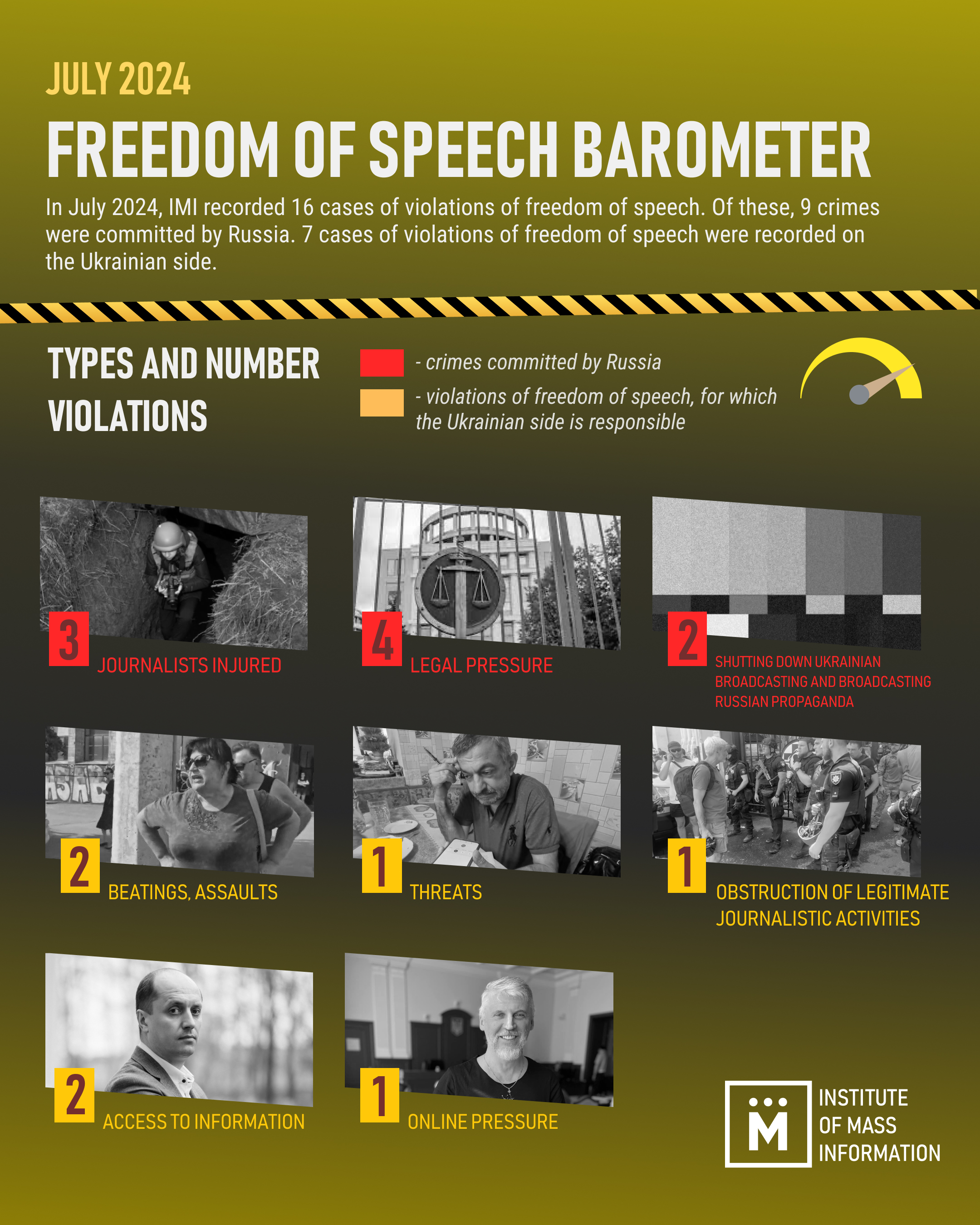The Institute of Mass Information experts recorded 16 freedom of speech violations in Ukraine in July, according to the monthly IMI monitoring “Freedom of Speech Barometer”.
Russia’s crimes (nine cases) inlcuded wounding journalists, legal pressure, and broadcasting propaganda.
Three journalists were injured by Russian shelling. Namely, two photographers from Kharkiv were wounded by Russian artillery shelling in the Toretsk district of Donetsk oblast on July 19. Olha Kovalyova received shrapnel wounds in the axillary, supraclavicular, suprathoracic areas and the arm, and a ribcage fracture. She was hospitalized. Krasnoshchok received a concussion. That day, the photographers were working with UAF artillerypeople.
On July 11, a videographer of the Kherson Oblast Military Administration, Ihor Zahnoy, was injured while filming the aftermath of an artillery strike on a Kherson residential neighborhood.

Freedom of speech in Ukraine in July 2024
Russian courts convicted four Ukrainian journalists in absentia:
- Dmytro Gordon was sentenced to 14 years in prison (a court in Moscow convicted him of calls for a war of aggression, inciting hatred with violent threats, public appeals to justify terrorism, and spreading “fakes” about the Russian army, motivated by political hatred);
- Fahrudin Sharafmal was sentenced to seven years in prison, convicted of “inciting hatred, rehabilitating Nazism and calls for extremism.”
- Oleksandr Prepodobny was sentenced to to eight years in prison in absentia under the law on “fakes” about the Russian army.
- Natalya Moseychuk was sentenced to five years in prison for “inciting hatred and enmity”.
The Russian Orthodox Church (ROC) has launched the propagandistic “Orthodox radio” Vera (“Faith”) in the occupied Melitopol (Zaporizhzhia oblast). Russian propagandists claim that the radio station is “intended to unite believers, helping them find the most important things in life – faith, hope, and love.”
The IMI also recorded 7 freedom of speech violations not related to Russia’s war on Ukraine. These included assault, death threats, obstructions to reporting, limiting access to public information, cyber bullying.
The attacks on journalists committed by Ukraine’s citizens happened in Kherson and Zaporizhzhia. In Kherson, an unknown man attacked the MOST reporter Olena Hnitetska. She was filming the impact of Russian shelling in the city when a man on a bicycle approached her swearing and started threatening her, demanding that she put down the camera. In her opinion, the man could have gotten annoyed because he happened to be in the frame, even though he would be barely noticeable there.
In Zaporizhzhia, journalist Kateryna Klochko was attacked by a participant in a rally against “unjust power cuts”. According to Kateryna, the attacker did not like the fact that she was not filming the car blocked by the protesters and demanded that she film the people who did it. When the journalist refused to do so, the woman grabbed the journalist by the arm, pushed her and forcibly turned her towards the car.
“Alternatyva.org” chief editor (Odesa oblast) Roman Varshanidze was threatened to be sent to the front line. An unknown man called him and claimed to be a Defense Intelligence representative. According to the journalist, that day he worked at a medical institution in Ovidiopil, where he had an unpleasant work-related conversation with the chief doctor.
In Kyiv, the police barred some journalists from reporting on the work of rescuers following the Russian shelling strike on the children’s hospital “Okhmatdyt”. This was reported by Kamila Hrabchuk. The police refused to explain the reasons for the refusal, while accusing them of wanting to make a scoop out of chlidrens’ blood.
Read the full monitoring here.
The Institute of Mass Information (IMI) is a Ukrainian non-governmental media organization that has been operating since 1996. The IMI defends the rights of journalists, analyzes the media field and covers media-related events, fights propaganda and disinformation and has been providing media outlets with safety gear for trips to the combat zone since the start of the Russo–Ukrainian war in 2014.
The IMI carries out Ukraine’s only freedom of speech monitoring and keeps a list of high quality and sustainable online media outlets, documents Russia’s crimes against the media committed in the course of the war on Ukraine. The IMI has representatives in 20 oblasts of Ukraine and a network of “Mediabaza” hubs to provide journalists with continuous support. The IMI’s partners include Reporters Without Borders and Freedom House; the organization is a member of the International Organization for the Protection of Freedom of Expression (IFEX).
